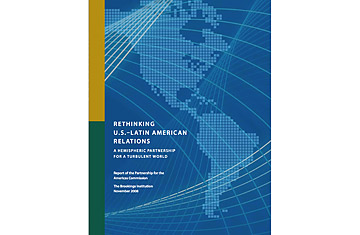
Rethinking U.S.-Latin American Relations
Report of the Partnership for the Americas Commission
The Brookings Institution; 32 pages
The Gist:
Latin America hasn't been a top foreign policy priority for the Bush
Administration. Two wars, tattered
Israeli-Palestinian relations and the nuclear ambitions of Iran and North Korea have conspired to consign the
region to the political backburner. But this Brookings report — issued by a cadre of decorated policy-makers, led by former
Mexican president Ernesto Zedillo and former U.S. Under Secretary of State
Thomas Pickering — issues a
pointed message to incoming President Barack Obama. Emphasizing Latin
American relations isn't just essential for the region, they say,
but also for America's own peace and prosperity. Tackling transnational
challenges ranging from clean energy to Cuba, the authors sketch a blueprint
for galvanizing relations with our neighbors to the south.
Highlight reel:
1. On "securing stable and sustainable energy supplies and mitigating
climate change":
More than 30% of U.S oil imports come from Latin American nations, a level
that outstrips even that which we take from the Middle East. Given
America's checkered standing in the region, it's an alarming figure. In
order to avoid being held hostage by fluctuations in the price of crude, the
authors recommend developing sustainable energy infrastructures—an endeavor
that will also help to suppress climate change. "The link
between carbon-intensive activities and changes in the world's climate is
now well established, and the consequences will be felt across the
hemisphere," the authors write, noting that if "current human activity
remains unchanged," the resulting "ecological shocks" could wreak havoc on
Central America, the Caribbean, and the southeastern United States.
2. On migration from Latin American nations to the United States: Though they're often portrayed as a burden on the U.S. economy, the report argues that immigrants are instead a key driver, and one which accounted for half the growth in our nation's labor force during the 1990s. Migrant contributions to the labor market have been obscured by illegal immigration, a political hot potato that has ramped up tensions between U.S. and Latin American nations. "On balance," the authors argue, "the impact of immigration on the U.S. economy has been significant and positive. Estimates of the net benefits to the U.S. economy put immigrants' net contribution at $50 billion per year. Immigrants boost economic output by increasing the size of the U.S. workforce and the productivity of American firms...Immigrants pay enough or more in federal, state and local taxes to offset what they consume in public services."
3. On "rethinking a troubled relationship" with Cuba: "U.S. policy should be reframed to enable legitimate Cuban voices to shape a representative, accountable and sustainable transition to democracy." Among the major overhauls recommended are the lifting of restrictions on American travel to Cuba, repealing the communications embargo, and knocking Cuba off the "State Sponsors of Terrorism" list.The Lowdown:
When confronted with massive challenges — and forming a "hemispheric
partnership" certainly qualifies — it helps to frame prescribed policy
changes in terms of sheer self-interest. This report does so deftly, mostly
eschewing wonkiness in favor of stressing common bonds. Its series of
"modest, pragmatic recommendations" are couched to show that the U.S. and
Latin America are natural bedfellows. It's not that we have a moral
obligation to turn the other cheek when Hugo Chavez dubs George Bush a
"devil," or when pockets of America inaccurately assign blame for U.S.
unemployment levels on Latin migrants. It's that doing so will, for example,
help both parties weather the global economic crisis. Some of these
recommendations (like the U.S. pivoting on its Cuba policy) may not take,
while others rehash what has become conventional wisdom (the war on drugs is
a pricey, ill-conceived boondoggle). But on the whole, the authors make a strong case for why a deeper U.S.--Latin American partnership is too logical not to forge.
The Verdict: Skim
Read "How Cuba's Find Could Change the U.S. Embargo
Read "Why Bolivia Quit the U.S. War on Drugs"
